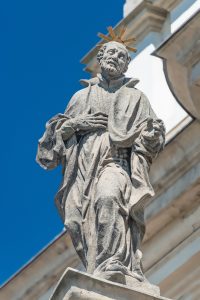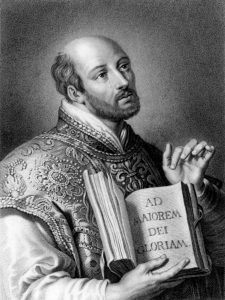The spiritual masterpiece of St Ignatius Loyola is his spiritual exercises. The purpose of the exercises were to not only prepare future Jesuits but also lay people to come closer to Christ. St Ignatius was Christocentric in his theology and philosophy. As a past injured soldier, he saw the world as a battlefront between two standards. The standard and banner of Christ and the standard and banner of Satan. Individuals must choose their banner and follow accordingly.
The Spiritual Exercises are intended to help one learn more about Christ and to become closer to Him. They are intended to help individuals form a personal relationship with Christ in the truest sense but also supply tools to grow closer to imitate Christ. It is the purpose to transform the Christian into a soldier for Christ, who gives up his or her will and surrenders to God. This is accomplished with numerous meditations, rules and ideas on virtue and faith.
The Spiritual Exercises are a guide to help Christians in this world. They help Christians not only form a better union with Christ, but help the conscience better follow Christ. Discernment, elections or decisions, examination of conscience, imitation of Christ, and guided visual meditation are all important elements in the four week journey of spiritual transformation. Found within these helpful guides are beautiful prayers, scriptural references and deep visual and mental meditations on the life of Christ. The Second through Fourth week actually guide the Christian through the life of Christ, emphasizing important principles and values a Christian must master in order to become more like Christ. Ultimately, it is a invitation to Christ and a personal experience with Him.

The first week focuses on the examination of conscience. It presents the person before Christ as a sinner in need of redemption. St. Ignatius asks the person to reflect on ones general sins and in particular, a singular sin of most concern. He then instructs the individual to monitor success and failures of this particular vice throughout the day and week. He instructs the person to give thanksgiving to God for the chance of redemption, the knowledge to correct and find pardon for one’s sin.
St Ignatius points out the nature of sin via the tongue and action, the sins of the angels and the sins of Adam. He calls for one to consider the greatness of God and the nothingness of the sinner and how sin is a cause of loss of friendship with God, robbing the soul of grace, peace of heart and true liberty. He implores the soul to consider the torments of Hell and the eternal separation of God, but begs the person to also see the lack of love one exhibits via sin towards God. For one to denounce the malice of sin, its deformity and in oneself, the folly, ingratitude and audacity to offend the Creator.
St Ignatius in the Exercises utilizes visual mediation as a key component of prayer and asks the soul to visualize images of the Prodigal Son, contemplations on one’s death scene, or one’s own judgment. He encourages one to see him or herself before God as judge and Satan as the accuser and how one would reflect on one’s life.
It is critical within the first week for one to find contrition before entering into the mysteries of Christ and His life.
The Second Week introduces the soul to the early and hidden life of Christ. It begins with the meditation on the Incarnation and the importance of the Trinity. In true Ignatian form, it calls for one to envision oneself within the scriptural story. Utilizing all form of senses to experience the event. In the house of Nazareth, St Ignatius encourages the soul to witness Mary saying yes to the Incarnation and to focus on the state of humanity, the will of God to repair humanity and how it would be accomplished through Mary and Jesus.
In the same fashion, St Ignatius invites one to recall the events of Christ’s birth and His early years. In doing so, St Ignatius helps the soul find the hidden values of such events. In the birth of Christ, St. Ignatius reminds one to recall the humility, poverty and suffering of Christ’s birth and through Christ’s hidden life, Christ’s obedience and labor.
The Spiritual Exercises again ask who are we to follow, the Banner of Christ or the Banner of Satan? What standard? And if so, how do we follow Christ perfectly? Among those who answer the call to be saved, converted and sanctified, Ignatius asks which type are you personally?
Some respond like a sick person, who recognizes the medication but refuses to take, while others only take partial what is needed, and finally like those who take all the medication needed. This analogy serves as a basis for how much is the soul responding to Christ’s call. An individual who answers must accept the entire law of God and with indifference of fear or shame fulfill the will of God for God’s glory. Ultimately, the highest answer to imitate Christ in poverty and virtue.
He concludes this week with discussions on discernment and election. How to know what choices are best in one’s life. AIHCP has a done a separate blog and video on this as well.
The Third Week of the Spiritual Exercises introduces on to the suffering of Christ and His passion. It proceeds from the Last Supper, Agony, and brutal crucifixion. Again, St Ignatius utilizes the same visual meditation techniques on presenting oneself at the foot of the cross or at the table of the supper. In Christ’s suffering, St. Ignatius points out Christ as victim who suffers for friends, sacrificing life and honor. St Ignatius also reminds the soul to imitate Christ as a model, in His submission to the will of the Father, His charity and act of love for friends, His humility and the grievous sight of sin that demanded penance and sacrifice from Christ.
The Fourth Week of the Spiritual Exercises excites the soul to resurrect with Christ and focus on the story of the Resurrection, post apparitions and life in heaven with Christ. He speaks of the joys of Heaven with no illness, sorrow, separations from God, temptations or sin. He emphasizes the trueness of love. He reminds the soul that love is work not just words. Christ requires reciprocity of love and His love lavishly gives. He asks so little but our love in return.

The purpose again of the Exercises is to bring one closer to Christ and present some important spiritual tools to help one achieve that. Discernment, elections of choice, examination of conscience, understanding the Standard of Christ, and meditation on the mysteries of Christ are all crucial in developing a strong Christian spiritual life. One through the exercises not only becomes more in love with Christ but can also become a true soldier of Christ.
Please also review AIHCP’s Christian Counseling Certification and see if it matches your academic and professional goals. The program is online and independent study and open to qualified professionals seeking a four year certification as a Christian Counselor.
Christian Counselors can benefit immensely from the Spiritual Exercises in their own life but also help other souls come closer to Christ. The skills in helping others mentor through discernment, examination of conscience, helping others through scruples, and how to better meditate on Sacred Scripture are immense aids to any Christian Counselor trying to guide another soul closer to Christ.
Sources
The Spiritual Exercises of St Ignatius Loyola: With Points for Personal Prayers from Jesuit Spiritual Masters-Fr Sean Salai, S.J
